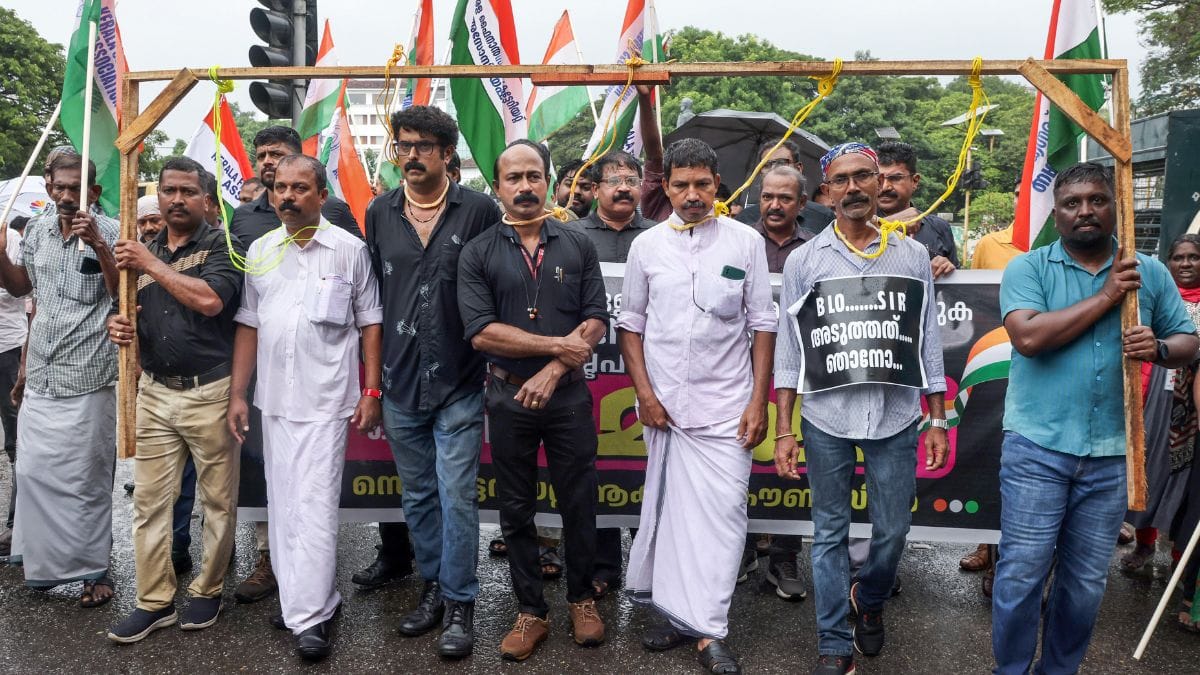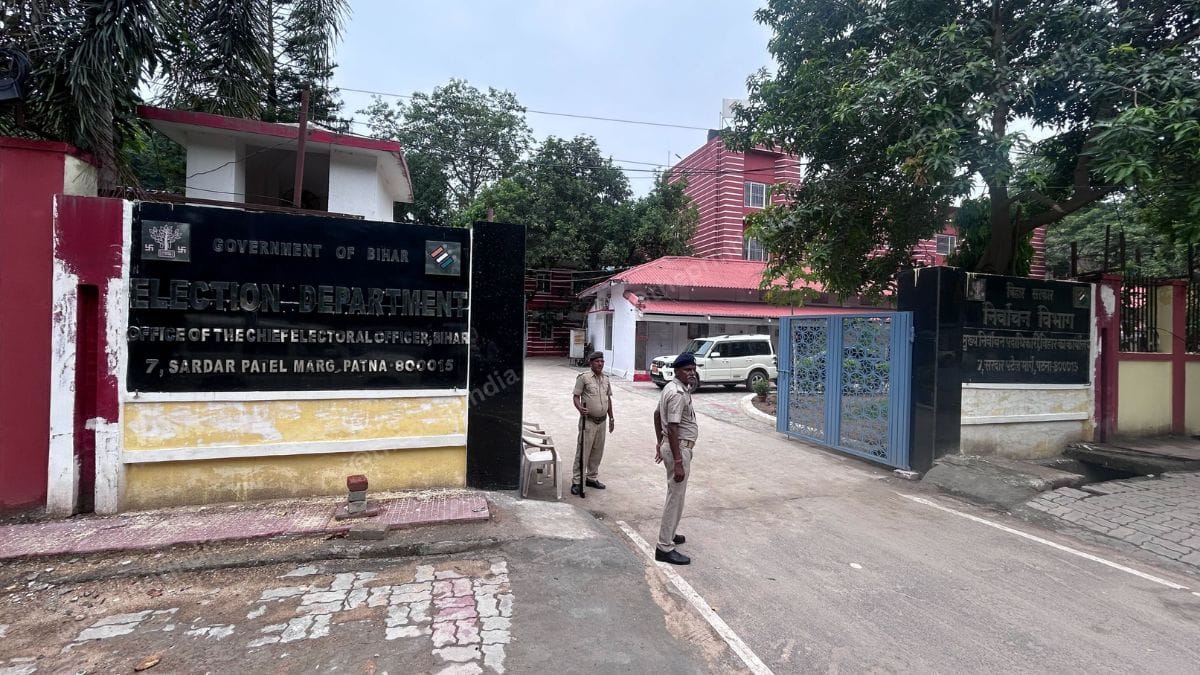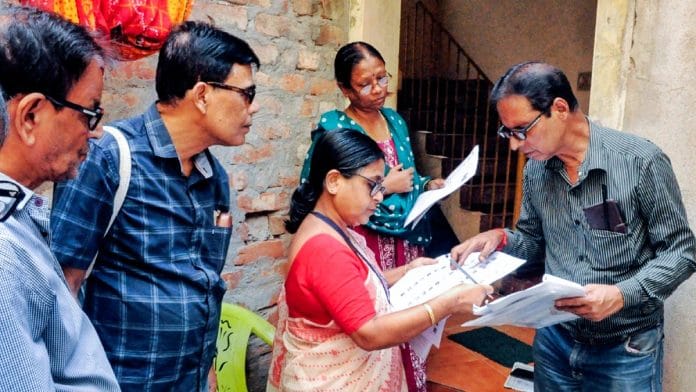Kolkata/Chennai/Kochi: After the death of a booth level officer (BLO) in Kerala, and one in Rajasthan, another BLO in West Bengal has died, allegedly by suicide, due to the workload owing to the Special Intensive Revision exercise initiated by the Election Commission of India (ECI) underway in 12 states/UTs.
A growing number of BLOs are raising the issue of excessive workload during the ongoing SIR exercise. With the deaths of BLOs in three states, scrutiny of the process has now intensified. Questions are being raised about institutional accountability.
On Wednesday, West Bengal Chief Minister Mamata Banerjee wrote on X that an Anganwadi worker and tribal woman, Shanti Muni Ekka, “took her own life under the unbearable pressure of the ongoing SIR work”. She said that 28 lives, in total, had been lost since the SIR began. “Some due to fear and uncertainty, others due to stress and overload.”
Earlier on Sunday, BLO Aneesh George, a school attendant by profession, died by suicide in his house in Kerala. Yadhu Krishnan P., the sub inspector at Kannur Peringome police station, which has been probing George’s death by hanging, confirmed to ThePrint that an autopsy found it to be suicide. He was under severe work stress, his family has said.
“At present, we are probing the causes that led to the death. We have already questioned his colleagues at the school and his family,” Yadhu said. The probe, he added, had not found anything conclusive yet to be revealed. George had done 90 percent of his work, according to the district collector, who maintained the BLO’s death was not linked to work.
A day after the tragedy, BLOs linked with several service organisations held a one-day strike in Kerala, alleging excessive workload and stress.

On the same day, Mukesh Jangid, a government teacher in Rajasthan’s Jaipur, working as a BLO, reportedly died by suicide Monday. He jumped in front of a train, the police have said, pointing out that he left behind a note, citing SIR work pressure.
A few days ago, BLOs in West Bengal’s East Burdwan had staged a protest in Katwa. They attributed “severe mental stress” and “immense workload” to the SIR days after Namita Hansda, another BLO, had died. It was a brain stroke, said doctors at the hospital where she was declared dead, reports say. Her husband has alleged that it was stress-induced.
“Such precious lives are being lost because of the unplanned, relentless workload imposed by the so-called Election Commission of India. A process that earlier took 3 years is now being forced into 2 months on the eve of elections to please political masters, putting inhuman pressure on BLOs,” Mamata Banerjee said in her post, urging the ECI to halt the drive “before more lives are lost”.
In Tamil Nadu, the Federation of Associations of Revenue Employees (FERA) has called for a boycott of the SIR, starting Tuesday. BLOs, supervisors, staff with civic bodies, teachers, and Assistant Electoral Registration Officers (AEROs) have been handling a continuous workload, the FERA has said. Additionally, some collectors are conducting review meetings till midnight and holding three video conferences a day, according to FERA.
“SIR is being pushed through, in haste, without any planning on ground realities,” a FERA office-bearer told ThePrint.
BLOs distribute enumeration forms among voters, collect them back, and upload the data to an app. A BLO is usually a government or semi-government official, familiar with voters and generally a voter in the area. BLOs are not full-time electoral officials and could be working as teachers, Anganwadi workers, panchayat secretaries, postmen, auxiliary nurses, midday meal workers, or contract teachers.
The ECI maintains that SIR has been going on smoothly. Its daily bulletin shows progress in all 12 states/UTs. Since ECI launched SIR this year, 98.89 percent of the nearly 51 crore registered electors in these 12 states/UTs have received the enumeration forms. However, only 20.19 percent of forms have since been digitised as of 3 pm, 20 November, 2025.
Also Read: ‘Convenient deflection’: 272 eminent Indians come out in EC’s defence in open letter to Rahul
‘How long should we work?’
In Kerala, BLOs already struggling with the deadlines of SIR said new responsibilities and are unexpectedly piled on them. Kerala has more than 25,000 BLOs.
Many BLOs and organisations that participated in the Monday protests told ThePrint that they are failing to meet voters, even after visiting their houses multiple times.
A teacher at the Government Higher Secondary School in Malappuram’s Manjeri—Abdul Nazar—was training on 3 November for the SIR. According to the initial training, the only responsibility of BLOs was to distribute enumeration forms in households under a booth and collect them back. If needed, they were trained to ask booth-level agents to help.
A deadline of 4 December to finish distributing 1,136 forms was set, Nazar told ThePrint. It would even have been achievable, but there’s no streamlining of work, which, along with stress, makes it difficult, according to Nazar.
“We received only 200 forms by 8 November. The difficult part is that there is no sequence we can set to visit houses. Among the first 45 forms I got, all were for different houses. Even if I went to one of those houses, I couldn’t give forms to all voters there,” he said.
In one such case, where he could distribute only two forms in a four-member household, the family contacted a local politician, who, in turn, called Nazar, questioning him about the issue. The family and the politician eventually understood his reasoning, but he was under unnecessary stress for days.
Similarly, on 14 November, the BLO received a message. ECI officials were meeting in person with BLOs who had failed to distribute 75 percent of the forms. Earlier, Nazar was helping voters, writing down their details on the forms, but he stopped. Now, he only distributes the forms to meet the deadline.
Nazar said that when the BLOs went back to work, they received another message over the weekend. The message was that they had three days to upload all the documents.
“They need to specify our responsibilities. First, we were asked to distribute and collect. But then we learnt that we had three days to upload and scan them. How can we upload so many forms through the phone in three days? How long should we work? They need to clarify,” he added.
Mentioning the suicide of a BLO in Kannur, Nazar said he could manage because of his experience of many years and familiarity with the region, but many new BLOs might be struggling with the process.
In Tamil Nadu, the FERA has demanded an additional month’s salary as honorarium for the staff involved in the process. The SIR process in the state requires the BLOs to distribute and collect voter verification forms, cross-check records, upload data online, and attend frequent reviews.
Officials handling the SIR work fear there may be a repeat of what happened in the 2002 electoral revision. In 2004, the ECI found serious errors and ordered a complete redo of the process that had been undertaken in 2002. With complaints already emerging from all political parties, officials privately fear a repeat now. Meanwhile, the ECI has fixed an incentive of Rs 10 per enumeration form.
While ECI officials say the work has largely not been affected due to the protests, a revenue official with the SIR team said, “If the strike continues beyond a few days, there is a risk of a backlog accumulating, which could prove difficult to clear before 4 December.”
What the BLOs do
The ECI’s 27 October order directed the SIR exercise in nine states and three Union Territories.
Daily, BLOs distribute enumeration forms to all existing voters through house-to-house visits. They also guide the public on completing the forms. They then collect the completed forms and upload them every day to the BLO app or ECINet. People can also upload their forms online themselves.
For electors whose enumeration forms are not submitted, the BLO has to identify a probable cause, such as “absent/shifted/death/duplicate”, based on an inquiry from the nearby electors and note the same.
The deadline for the entire process is 4 December. The draft rolls will be published on 9 December.
In August this year, while the SIR process was ongoing in Bihar, the ECI doubled the annual remuneration of BLOs. It also enhanced the remuneration of BLO supervisors involved in the preparation and revision of the electoral rolls. Among other things, the ECI increased their annual remuneration from Rs 6,000 to Rs 12,000. It also approved a special incentive of Rs 6,000 for the BLOs for SIR, starting from Bihar.

“The electoral roll machinery, consisting of Electoral Registration Officers (EROs), Assistant Electoral Registration Officers (AEROs), BLO Supervisors, and Booth Level Officers (BLOs), do a lot of hard work and play a pivotal role in preparation of impartial and transparent electoral rolls,” the press note had said, pointing out that the last such revision in remuneration was done in 2015.
Following George’s death, the Kannur district collector issued a press release, saying that 1,065 enumeration forms were assigned to George, out of which only 50 forms were left to be distributed.
The press release claimed, “At no stage were special targets, pressures or deadlines issued to him (George). Based on information currently available from both police and administrative inquiries, no linkage has been established between SIR-related duties and the unfortunate death of the BLO.”
A blame-game
In Kerala, the Congress-led Opposition has also alleged pressure on the BLOs from the ruling CPI(M). The Kerala Non-Gazetted Officers (NGO) Association, a service organisation affiliated with the Congress, blamed the Kannur incident on harassment by the local CPI(M) workers, against the backdrop of a Congress BLA accompanying Aneesh during his duties.
“It’s not just work stress; there is also political pressure from the ruling party, besides work pressure. It shouldn’t be taken lightly. Aneesh was harassed by local CPI(M) workers when he took a Congress BLA along with him,” said Chavara Jayakumar, the Kerala NGO Association’s president.
CPI(M) Thiruvananthapuram district secretary V. Joy, meanwhile, rebuked the Congress for trying to make gains out of a tragedy.
“The only job they have is to distribute and collect the forms. How can we influence that?” Joy asked when contacted by ThePrint. He added that all parties had requested that the SIR be started after the local body polls. Many BLOs, after all, have work related to the local body elections.
“Everybody is busy with local body polls now. Nobody has time to check the process or even think about it,” said Joy. “It (ECI) wants the final list to be out by 9 December when the state votes for local body polls…they are in a hurry.”
‘Severe strain’
The Kerala government has taken its fight to the Supreme Court. On Monday, it filed a fresh plea to defer the SIR exercise. In its petition, which has been seen by ThePrint, it has pointed out that the state is scheduled to vote for the local body polls in two phases on 9 and 11 December.
The petition asserts that 1,76,000 personnel are required for local body polls, in addition to 68,000 security personnel. The conduct of SIR requires the services of an additional 25,668 personnel.
“This puts a severe strain on the state administration, bringing routine administrative work to a standstill…The same officials are to be deployed for duties in connection with SIR and LSGI elections,” it has submitted.
Last week, Goa’s Chief Electoral Officer, Sanjay Goel, also flagged such administrative concerns. He said he even requested the state government to postpone the Zila Panchayat elections until the SIR was completed. Following that, on Tuesday, the polls scheduled for 13 December were postponed to 20 December.
Apart from Bihar, the Supreme Court is hearing petitions challenging the exercise in various states, including Tamil Nadu and West Bengal.
(Edited by Madhurita Goswami)
Also Read: ECI reacts to vote chori with passive aggression and no action. Media is doing the same






